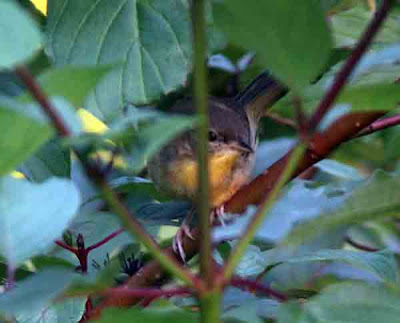One of the challenges for me in taking photos of birds is getting them in focus — whether it be in a breeze with the camera moving or the autofocus zeroing in and out on a branch instead of the bird. Birding in New England (or essentially anywhere) means stalks, branches, vines, leaves are often between you and the bird. It’s often a challenge with binoculars or a scope but usually manageable — the bird hops up for a few seconds and you at least get a good look. Whether you can grab a photo is another thing.
I had a situation yesterday where a Grey Catbird was deep in a grapevine. I could see him grabbing a grape and eating it but the camera auto-focus was jumping all around. (I know, switch to MF but I had a dog on leash “helping” me.) So I fired off a burst and the image below is the result: not in great focus but it captures for me the grape-eating catbird that was entertaining me.
 |
| A furtive Grey Catbird hides out in a tangle of grapevines. |
I’ve gone through some of my shots from this Fall and picked a few “I’m hiding” shots that are below. Notice, aside from the Common Yellowthroat, there are no warblers. That’s next year’s project.
 |
| White-throated Sparrows are rather cooperative, sitting still and just watching. |
 |
| Likewise, Song Sparrows can give you a decent opportunity for photos. |
 |
| Common Yellowthroats bounce around a lot in the underbrush, chipping away. |
 |
| And they are often very buried in the bushes — you get glimpses but manual focus helps. |
One of the nice things about digital photography is that you can rather easily, on a damp fall evening with the wood fire going, revisit some of the neat birds you saw during the spring and summer. So some of the shots are a little blurred, you still can enjoy seeing once again some of the birds that are now thousands of miles south of here, and look forward to spring migration.
Discover more from Vermont Birder
Subscribe to get the latest posts sent to your email.
